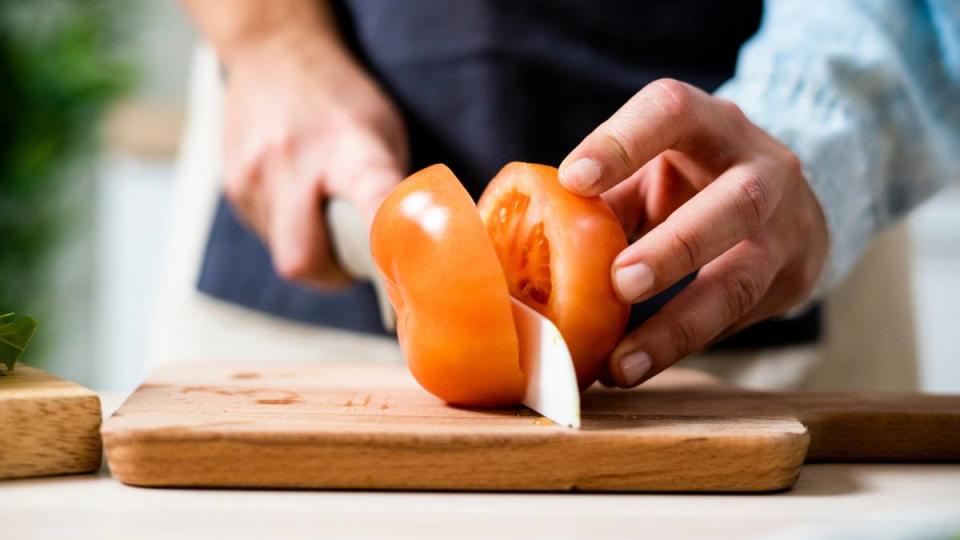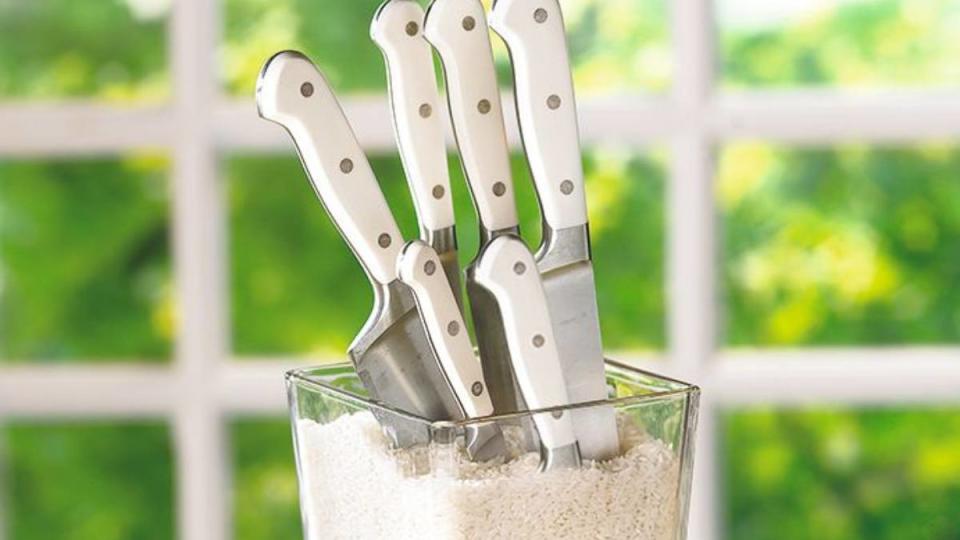How to Sharpen Knives at Home Safely + the One Thing You Never Want to Do with Your Knife
While cutting up some lettuce for your salad, you notice that it's taking you a little longer than usual — not to mention you're having to put in a lot more effort and it's not cutting evenly. The likely culprit? A dull knife. And harder to cut food isn't the only downside. Experts say using a dull knife can actually increase your chances of cutting yourself! Luckily, you can actually salvage the knife by simply sharpening it and you don't need any special expertise or tools to do it. Keep scrolling to learn how to sharpen knives and how to keep them sharper for longer.
Why should you sharpen your knives?
You already know that using a sharp knife makes all of the difference when it comes to prepping food, says Gabriela Pollack, owner of New York-based chocolate shop Brigadeiro Warehouse. "It works with precision and smoothness, becoming less likely to slip or demand extra pressure to cut," she says. But a more surprising reason sharpening your knives is so important is safety?
"Sharping knives prevent injuries," explains Scott Franqueza, an executive chef at High Hampton Resort. "A dull knife is the reason many people cut themselves." The reasons why?
More force is required: With a dull knife, you often need to apply more pressure to make the cut. This increased force can lead to slips or loss of control, causing accidental cuts, he explains.
Uneven cuts: Dull knives can create jagged or uneven cuts, which can be more difficult to control and predict., explains Franqueza. This increases the likelihood of the knife slipping and cutting unintended areas.
Inconsistent pressure: When using a sharp knife, the blade easily slices through with minimal resistance. With a dull knife, you might encounter resistance and then sudden release, making it difficult to maintain a steady hand and increasing the risk of injury.
Slippage: Dull knives are more likely to slip off the surface of the food you're cutting. This can lead to the knife coming into contact with your skin unexpectedly, resulting in cuts or punctures.
How to know if your knife needs sharpening

You may already be struggling to cut certain foods, but Chef Franqueza has an easy at-home test that you can take:
"For the home cook, a tell-tale sign that it's time to sharpen your knife is when you cannot easily cut a tomato," he says. "If you cannot successfully slice a tomato without damaging the flesh, it is time to sharpen your knives."
How to sharpen knives: 2 easy methods
After determining that your knives are dull, the next step to making them as good as new is sharpening them, and these two methods make it easy.
Enlist a whetstone
"I personally use whetstones when sharpening my knives," says Franqueza. "This tool is, in my opinion, the best way to maintain and keep your knives sharp without damaging them." After soaking the stone in hot water for about five minutes, place one side of the knife on it and gently move it up and down the stone at a slight angle upward. Then, after about 12 strokes, flip the knife over and sharpen the other side.
Others, like Luis Mata, co-founder of Meat N' Bone, also recommend this method.
"Whetstones remain sharp for much longer than traditional sharpening tools," he says. "They shed softer particles, retaining the tougher, abrasive ones. This ensures prolonged sharpness."
To see this method in action, watch the video below.
No whetstone? Use a ceramic cup
"I like to turn a ceramic cup upside down and glide the knife edge on the ring," says Pollack. To try this tip, simply take your ceramic coffee mug and turn it over. Then, run the knife blade across it quickly for roughly 15 to 20 seconds. The abrasive and rough surface on the bottom of the mug with help sharpen the blade without damaging it. Just be careful to watch out for your fingers.
To see this method in action, watch the video below.
How often should you sharpen your knives?
There is no reason to overdo how often you sharpen your knives. In fact, Franqueza only recommends doing it once a month. "For someone who regularly cooks at home — let's say five nights a week — I would suggest sharpening your knives at least once a month," he says.
But if you want your knives to always be razor sharp, Franqueza says honing them is the best way to do that.
"It is important to regularly hone the knife on a honing steel," he says. "Honing helps maintain the edge and alignment of your knife in between sharpening. Ideally, it is best to hone your knife after each task."
To learn how to hone your knives, watch the video below.
How to keep knives sharp longer
1. Make sure to dry them thoroughly
One way to ensure that your knives remain sharp is to always fully dry them before storing them. "Depending on what the knife is made of, water can dull the blade, cause rust or degrade the handle, causing it to weaken," explains Mata. "So, always make sure to dry your knife after washing."
2. Store them safely

The way you store your knives might also damage their blades. To combat that, Pollack recommends, "avoiding direct contact with other utensils, but putting your knives away in something like a block or sleeve. If they don't come with those options, line a drawer with a silicone mat and dedicate it to your knives."
Want to make your own knife block? Simply fill a large vase or other container with rice, then slide the knives in, blade down. The grains help to keep the cutlery upright and accessible.
Related: 15 Brilliant Uses for Uncooked Rice That Save You Time + Money
3. Never do this
Another simple way to keep your knives sharp is to avoid overusing them when getting rid of food scraps. "Never scrape food off your cutting board using the bladed edge of your knife. This is terrible for the blade," warns Mata. Instead, he recommends, "Simply turn the knife over and use the blunt side to scrape chopped food off."
For more on sharpening tools, click through the links below!
How to Sharpen Your Lawn Mower Blades on Your Own to Save Time And Money: Pro Landscapers Weigh In
How to Sharpen Scissors So They’re as Good as New — Genius Hacks Make It Easy

